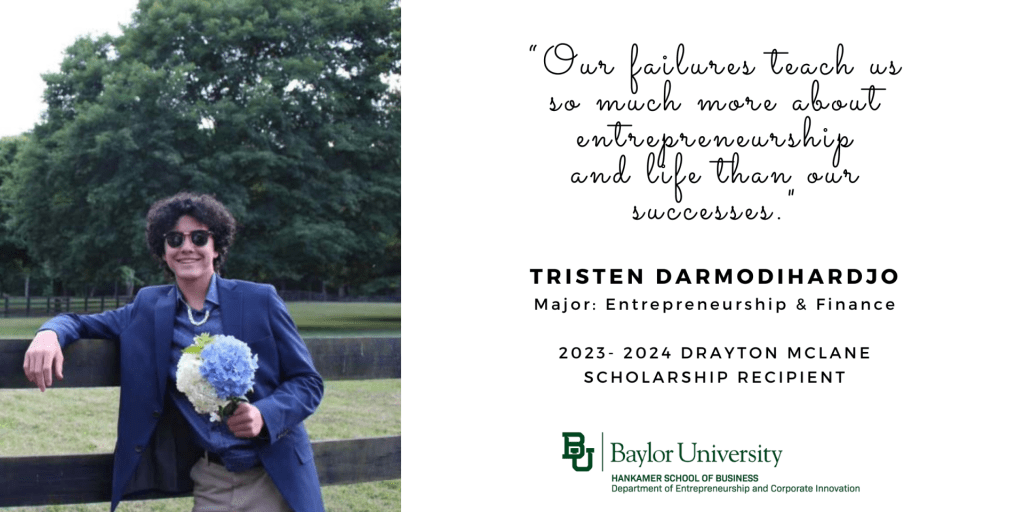
“It’s rewarding to be back on campus
in a position where I can assist and support
entrepreneurially-minded Baylor students.“-Jacob Kehoe
Think about a time when a mistake actually turned out to be a good thing. The time you made a wrong turn, and as GPS recalculated, you stumbled upon the best off-the-beaten-path oasis, hole-in-the-wall coffee shop. Or the time you missed your shuttle and ended up in a ride-share with your future soulmate. Or that time you unintentionally enrolled in an entrepreneurship class that actually changed your entire career path.
Jacob Kehoe was the high school student who landed in an entrepreneurship class by mistake. Growing up, he wasn’t the kid who came up with the money-making gigs. You didn’t see him around the neighborhood washing cars, mowing lawns or selling lemonade. He was the kid in his parents’ garage trying to build things with scrap metal and his grandpa’s old tools. Entrepreneurship wasn’t even really a blip on his radar. But Jacob stuck it out in the entrepreneurship class he wasn’t supposed to be in. Then something happened. During the class there was clarity. Jacob found inspiration in Steve Jobs and Sam Walton as his career aspirations started to completely change course. Jacob had the spark, that entrepreneurial spark that ultimately turns into a fiery passion. Could this class mistake actually turn out to be a good thing?
No mistakes were made when it was time to decide on higher ed. Baylor University was always the top choice for Jacob. The class sizes were a plus, but what ultimately swayed the pendulum is Baylor’s unabashedly Christian foundation.
While at Baylor, Jacob had no intention to let this new-found entrepreneurial spark fade. He teamed up with management professor Wayne Hampton and co-founded Aerial Intelligence and Reports (AIR). What initially began as a school project, evolved into a real business venture. AIR utilized drones to capture roof images, which were processed through a machine learning program to identify damage, generate cost estimates, construct 3D models of buildings and even produce bills of materials.
Jacob firmly believes that Baylor’s small class sizes and the countless campus opportunities are some of the University’s biggest assets for students. He feels students absolutely need to soak up all the expertise and knowledge from their professors. For Jacob, Professor Hampton and Entrepreneurship Professor Shaun Limbers had impactful influences on his journey. He explains, “I think all students should dig deep into all the resources that Baylor has to offer, both in programming and personnel.” He continues, “I spent countless hours in professors’ office hours picking their brains and absorbing their knowledge.”
Jacob graduated Baylor with a BBA in Marketing and soon after landed a full-time entrepreneurial gig at Startup Waco. Startup Waco is a hub for the entrepreneurial ecosystem for the Greater Waco community. By creating a culture of entrepreneurship, Startup Waco is a conduit of support for local businesses.
At Startup Waco, Jacob was responsible for programming initiatives that provide crucial resources, mentorship and networking opportunities to early-stage startups in the Waco community. He also worked to create opportunities for economic growth and creation through strategic partnerships and initiatives that strategically positioned Waco as a premier destination for businesses seeking to establish or expand operations.
In 2023, Jacob had the opportunity to come back to Baylor as staff with the Baylor Angel Network (BAN). BAN is a unique opportunity that provides students with outside-the-classroom experiences that allow them to engage with businesses, people and capital. With BAN, student analysts are immersed in a deep understanding of startup funding and private company investing.
As the BAN Associate Director, Jacob is typically the first point of contact for most of the involved entrepreneurs. He oversees BAN operations by encompassing deal sourcing and assessment, investment and communications strategies. In this role he is also actively engaged with the student analysts. He says, “Returning to Baylor and interacting with both entrepreneurs and students has been an incredible experience.” He continues, “It’s rewarding to be back on campus in a position where I can assist and support entrepreneurially-minded Baylor students.”
What started out as a perceived mistake certainly turned out to be a good thing for Jacob. This entrepreneurial gig is a very, very good thing indeed. Sic ‘em, Jacob!
For more information on Baylor Entrepreneurship, please visit our website at baylor.edu/business/entrepreneurship/.


